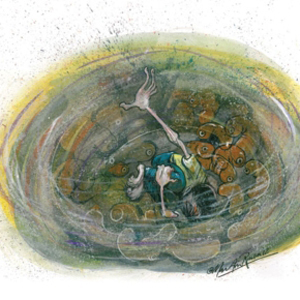The traditional Christian denominations have long been influential in Uganda, but since the 1990s a competitor has spread in the form of Pentecostalism – so-called because of the emphasis on the power of the Holy Spirit that supposedly descended on the apostles on the day of Pentecost. These churches differ from traditional ones not only in name. Their leaders prefer titles like pastor or apostle, and they seldom undergo formal leadership training, preferring to claim religious authority on the basis of an alleged meeting with Christ or an assumed anointing by the Holy Sprit. Their mode of preaching is anything but humble; they shout on loud speakers messages of prosperity, and no prayer session can be concluded without a Holy Spirit experience, where believers are compelled to receive the Holy Ghost, which is allegedly manifested by the speaking of strange tongues. The use of traditional African music, accompanied by singing and dancing, draws in the younger generation and believers are taught to give generously to the church in the form of a tithe (a tenth of their income) and free-will offerings, which reinforces the widespread poverty among the flock and the obscene wealth of the church leadership. In the Ugandan capital, Kampala, these churches can be easily identified by their gaudy names – Miracle Centre, Christian Life Church, New LifeTabernacle Church, Holy Fire Ministries – although Pentecostal churches are springing up so quickly many still lack a name of any kind.
Strolling through Kampala one has to battle with the heavy traffic and air pollution, but this quagmire has of late been compounded by the increasing numbers of Pentecostal evangelists working the streets, especially in busy spots like the Jinja Road roundabout, Queen’s clock tower and St Balikuddembe market. Men and women, young and old, parade the street armed with the Bible, appealing to pedestrians and motorists to be born-again. They are sometimes accompanied by interpreters in case somebody does not understand their language.
One wonders how such people earn their living since for them it is their divine duty to preach, be it dawn, noon or dusk. I approached one lady at the clock tower to ask how she earns her keep given that most of her time is spent in street evangelism. She told me her subsistence and rent are met by her mother church, the Divine Church of Christ near Entebbe airport. In many Pentecostal churches young people are paid to preach on the streets, stressing the imminent second coming and the necessity to repent.
Pierre Rukundo, associate professor of philosophy at Makerere University, believes the rise of Pentecostal evangelism in Kampala is due to a culture of religious extremism, which he stresses is not just a preserve of Islam. But Islam’s recent high profile has introduced a new competitiveness in the market for salvation, and it is the Pentecostals who have risen to the new challenge. The Pentecostal movement is bent on converting as many as possible by any means necessary, which includes shouting on the streets.
Pastor Royer, a missionary at Kampala Central Church, supports the idea of street evangelism; it is a practice used in his own church. Visiting him at his office, I asked why there seems to have been a visible increase in street evangelism in recent years. He says Pentecostal churches in the United States provide funds for ministering in the developing world, which enables churches in Uganda to fund street evangelism and door-to-door missions. You can see the evidence of this funding in the expensive amplification equipment and numerous glassy flyers with which the pavement-bashers are armed.
Moreover, for churches to receive more funding they have to convince their benefactors of the numbers of fresh converts they have registered. As religion in the West gradually loses its appeal the Pentecostal movement has turned to the third world, where more expressive, and exploitative, forms of Christianity are finding a foothold.
In a developing city like Kampala, the majority of people are preoccupied with making a living for their families. Uganda is joining a capitalist world where people have little or no time for church, so the extremist Pentecostal movement has resorted to street evangelism to aid their recruitment drive. However, these activities may be proving counterproductive. Peter Walubiri, a humanist from Kampala, believes many people are becoming less religious in the face of religious exploitation, turned off by the churches that are so demanding under the guise of giving to the Lord.
Those who do believe are convinced that they are impoverished simply because they do not give enough to God. Poor adherents are especially vulnerable, and are being convinced that they must contribute a portion of their meagre wages to the church, that it is holy to go hungry. Needless to say this is not the fate of the church leaders. In May this year the Kampala newspaper New Vision told of one Pentecostal pastor, William Muwanguzi, who operated a church in a corrugated iron shack yet lived a life of extreme luxury. He faked miracles by hiring people to give false testimonies in order to attract large crowds and asked for gifts from his flock in return for God’s blessings, using those contributions to bestow upon himself a top-of-the-range Hummer 4x4 rumoured to have cost more than £180,000. Muwanguzi was later arrested in relation to a car theft scandal, but his is just one example of the widespread, but under-investigated, exploitation of the credulous population of Kampala.

